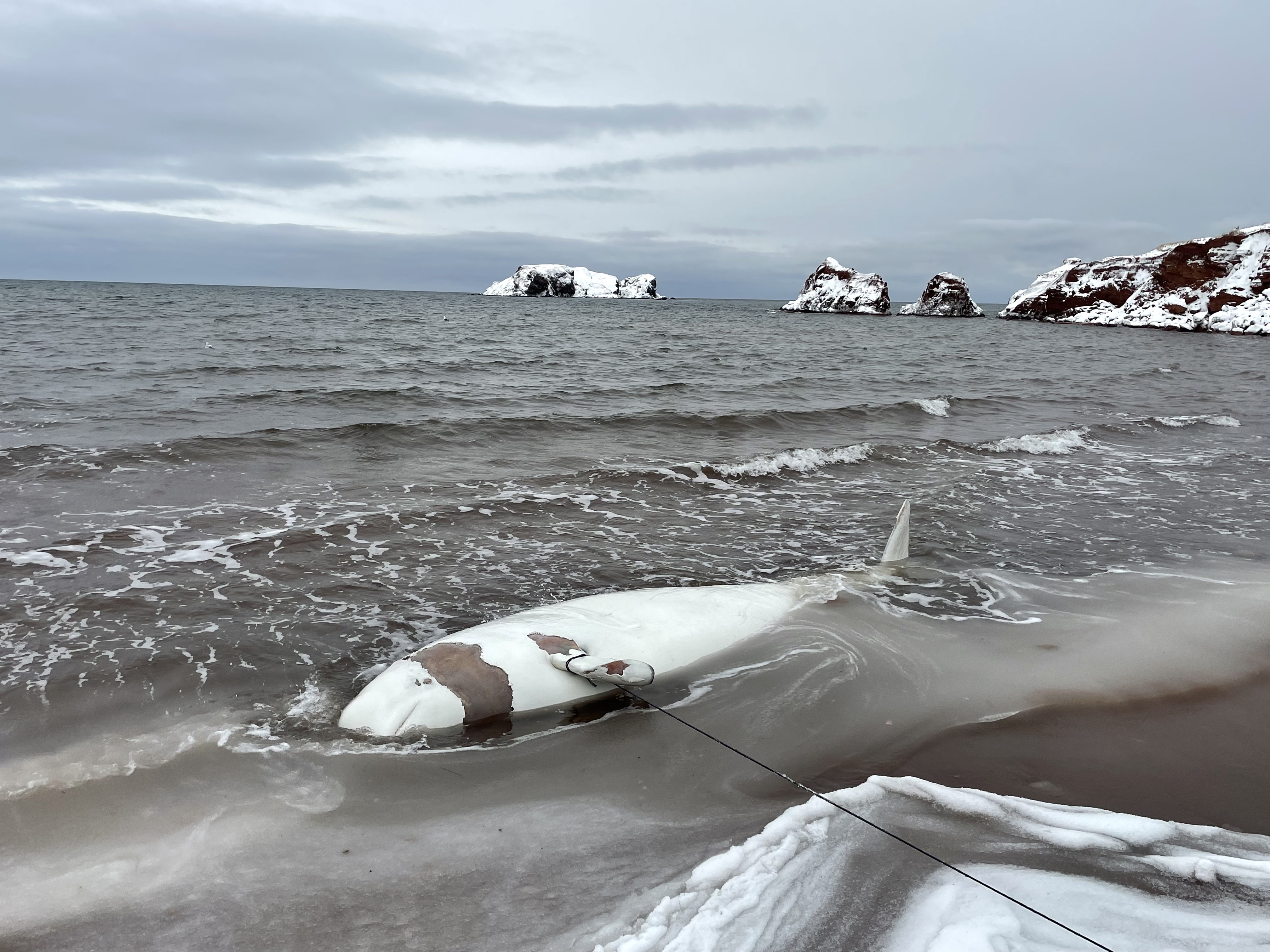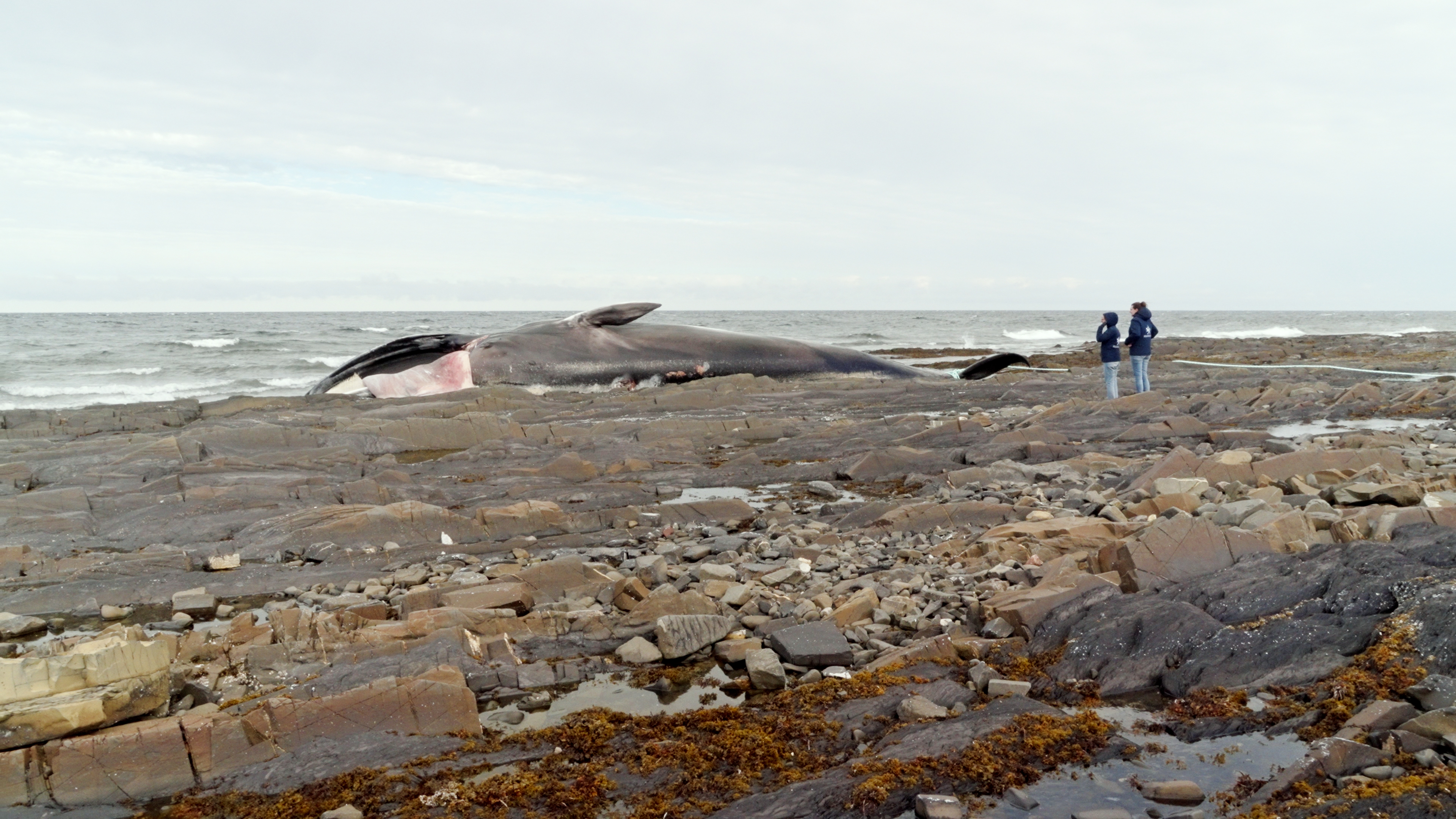A young harbour seal was reported last week on a Gaspé Bay beach. The case sparked many reactions and unprecedented efforts have been made by Marine Mammal Emergencies and its staff to raise awareness amongst local residents and inform them of the best course of action to follow.
The first report came in on Wednesday, May 25, when a Marine Mammal Emergencies volunteer went to the scene after being informed that residents had tried to coax the hours-old pup back into the water. The seal was in a busy location. The animal was energetic and was making vocalizations, which, although normal, nevertheless raised concerns among passersby. Volunteers monitored the situation several times a day. The seal moved around, returned to the water, rolled around in the sand and was alert. Tracks in the sand suggested that its mother was returning to the beach to nurse.
Video of the seal pup, May 26, 2016 (images: Marie-Claude Rancourt, Marine Mammal Emergencies volunteer)
Although the situation seemed to be under control, the seal risked being disturbed if residents did not take note of the posters describing the guidelines to follow (in French). This is indeed what happened in the following days: people tried to pet the seal, prod it back into the water with a stick, and lay next to it to take photos. Some people even said they were going to feed it with a bottle.
By June 1, the seal was emaciated and its condition had worsened. The female had most likely abandoned her young. The pup has not been seen since June 2. At the time of writing on June 7, an individual who had been walking in the area reported a young harbour seal carcass in this sector with a description that suggests that it is the same animal.
Video of the seal pup, June 2, 2016 (images: Marie-Claude Rancourt, Marine Mammal Emergencies volunteer)
To prevent a similar incident from recurring, Marine Mammal Emergencies reminds the public of the guidelines to be followed and the actions to be taken in this type of situation. It should be noted that the Quebec Marine Mammal Emergency Response Network has developed response strategies and procedures with wildlife specialists and veterinarians.
Natural phenomenon
The lives of seals are split between the land and the sea. It is normal to see a seal on shore, particularly at this time of the year, when harbour seals give birth and nurse for 4 to 6 weeks. A seal on the beach is not in trouble. The only thing to do is to leave it alone.
Do not approach it
Seals are wild animals, and as such are not accustomed to human contact. Repeated interactions with the meddlesome can exhaust them and cause them great stress. Moreover, human presence can frighten the mother, who might go so fas as to abandon her young.
Do not touch or handle it
A mother will also abandon her young if she does not recognize its scent. Also, bear in mind that these are wild animals; a seal can be aggressive, bite and transmit disease to humans. Although pups will allow themselves to be approached, they are unpredictable and can quickly become aggressive.
Moreover, the Canadian Marine Mammal Regulations make it illegal, in Quebec, to approach, handle or administer care without a licence from Fisheries and Oceans Canada. Anyone violating this law can be fined.
Do not attempt to push it back into the water or spray it
Seals frequently rest along the shoreline or on rocks jutting out of the water, so do not attempt to interrupt this activity. A seal can remain out of water for a long time. Pushing it back into the water does not help it; on the contrary, doing so can cause it harm.
Do not try to feed it

If a pup has been left to fend for itself and appears emaciated, it is a natural condition and human intervention will not increase its chances of survival. Experts are quick to point out that seals are likely to experience less stress and fare better when there is no human interference. The recommended action is to let nature take its course.
There is a moratorium on rehabilitation in Quebec; it is thus illegal to release a seal into its environment if it has been kept in captivity for treatment, in order to prevent the transmission of pathogens that could affect other wild populations with weak immune systems such as belugas.
In cases where public safety is at risk (aggressive seal) and/or people are not following the guidelines, please contact Marine Mammal Emergencies at 1-877-7baleine.
In the Media (all articles in French):
Bébé phoque à Cap-aux-Os, Radio Gaspésie, June 1, 2016
Que faire lorsqu’on aperçoit un phoque échoué sur la plage ?, Radio-Canada, May 26, 2016
Le phoque commun victime de sa bouille sympathique, Le Devoir, May 21, 2016
Bébés phoques: même si on les trouve trop mignons, il faut les laisser en paix !, Journal Haute Côte-Nord, May 3, 2016





